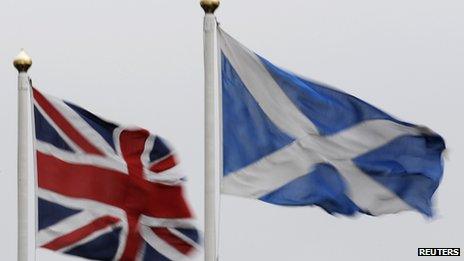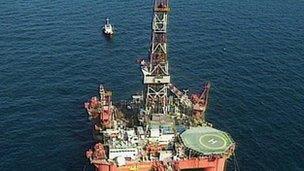How long 'til independence?
- Published

Businesses are said to be focussed on the eurozone crisis and less concerned about the British constitution
Corporate Scotland has been slow and reluctant to step up to the independence debate, but it's beginning to make its presence felt.
And the area where it's focussing a lot of attention is on the cost, the pace and the complexity of the transition.
At a conference hosted by The Scotsman newspaper on Tuesday, finance secretary John Swinney set out the case for the powers to tackle inequality, and to pick up on the economic opportunities that Westminster rule has missed.
But while there's a lack of any alternative prospectus, of a vision for what the UK could deliver Scotland if it votes to stay where it is, it's the 'yes' side that's taking the pressure - not on the vision, but on the means of getting there.
Contributors are keen to keep some perspective. Business-people are being kept awake by the eurozone crisis at the moment, far more than concerns about independence.
Friendly fire
The plea from David Watt, of the Institute of Directors, was to focus on what needs done for the economy now rather than the debate about a vote in 28 months.
"Business will respond whatever way the voters decide," he said. "Business will cope, survive and ultimately thrive whatever the constitutional format is."
Some of it looks a bit like friendly fire. Professor John Kay is the Oxford economist and columnist who has previously backed independence and was one of Alex Salmond's Council of Economic Advisers.
He flatly denies the notion that Scotland could pull significant corporation tax levers, saying neither the rest of the UK nor the European Union would let it do what Ireland did, with a beggar-thy-neighbour tax on profits of 12.5%.
What if Holyrood cuts to 20%, as Alex Salmond is promising American investors in California this week - and this at a time when the UK Government is cutting to 23% and wants to go further? That wouldn't make much difference to investment anyway, says Kay, so others wouldn't object, and what's the point?
Volatile and complex
Prof Alex Kemp, the pre-eminent Aberdeen University oil and gas expert and an old chum of the First Minister, wasn't much more helpful to the cause. Yes, there could be lots more oil under Scottish seas, he confirmed, though the 23bn barrel estimate is at the top end of what's possible.
And yes, there could be tax revenue. galore. But the $27 per barrel fall in the price of Brent crude in recent weeks is a reminder of volatile tax take, perhaps ranging from £5bn to £10bn per year over the next ten years.
Hence, it would be "very dangerous" to continue doing what the Treasury has done since Forties began to flow, and wiser to put the revenues aside. That, he didn't have to point out, would leave the Scottish government books unbalanced.

Within 20 years, half of British oil production will be from west of Shetland
The problems include the stuff remaining hard to reach and requiring tax breaks to incentivise more production. By the 2030s, half of production will be from west of Shetland.
And there are decommissioning tax breaks soon to kick in, with the potential to claw back tax from an independent Scottish government that could reach back to 2002.
That's in addition to the dazzling complexity of transferring the regulation of oil and gas from Whitehall, which has all the data.
"Transitional problems could involve negotiations extending a considerable period," pointed out Prof Kemp.
Negotiating tactics
John Kay was estimating the initial negotiations on independence, after the 2014 referendum, could take two years, followed by around three years of implementation.
And he shares with the other experts at this conference a questioning of how the rest of the UK would respond. England, Wales and Northern Ireland wouldn't be in much of a rush, and collectively, they would have their own agenda to pursue, says Kay.
All this considerably stretches and challenges the preferred schedule of the Scottish government that a 2014 referendum would be followed by around a year of negotiation. So the May 2016 Holyrood election would be the first independence election.
Somehow, that has to avoid the delays likely around a May 2015 Westminster election. It also runs the risk of becoming the referendum on the negotiations themselves.
I guess the contribution the Scottish Government will want to take most seriously was from Owen Kelly, chief executive of Scottish Financial Enterprise, the sector's representative organisation.
He has already said the assertion that the Bank of England would oversee Scotland's banks and other finance houses is simply illegal under European law.
Terms and timetable
But he's asking about a lot more than that; tax, regulation and access to markets. And the finance sector believes one of the big questions is about Scotland's membership of the EU.
There's no doubt it can be in Europe. Kelly, a former fast track civil servant, asks instead; what terms and what timetable?
If Scotland simply inherits all the UK's position in law, as the SNP says, then that's fine. But what if it doesn't? And why can't we be told, so we can make an informed decision? This is, he points out, not a question for the Scottish government to answer.
If that legal position is wrong, and Scotland is seen to secede from the UK, creating a new state, not only would the new government have to negotiate EU accession, possibly including a commitment at least to prepare for euro membership, but the UK's extensive range of tax treaties might no longer apply. These have been amassed over time, and are important to financial firms to avoid double taxation.
And what of market access? Some SFE members have 90% of their customers in the rest of the UK. It can't be assumed, says the organisation's chief executive, that using the same currency guarantees a single market. The euro hasn't achieved that in financial services. So what can SFE members tell their shareholders about the risk that markets will become dislocated?
Why does Owen Kelly's voice matter so much? It's not just that his sector employs more than 90,000 Scots, with some high end jobs in there. It's also because his members are looking after a lot of Scots' savings and investments.